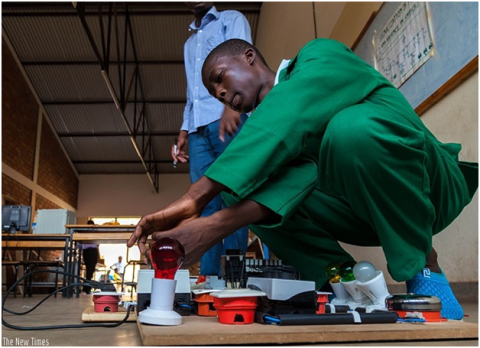
Rogers Dushimiyimana from Alliance High School explains how his project of signal of presence and abscence of people in office works. (Timothy Kisambira.)
A new study on Vocational Education has shown areas where the training is paying off and what more needs to get done to get the best out of the programme.
One of the issues raised was that fresh Technical and Vocational Education and Training (TVET) graduates find it hard to get jobs for lack of experience.
The findings of Study on the Adequacy between the Current TVET Programmes and the Labour Market Needs in Rwanda" was released in Kigali last week.
It was commissioned by four labour organisations in Rwanda.
The organisations include the Labour Congress and the Brotherhood in Rwanda (COTRAF); Federation of People's Movements (FMP), Centre for Workers' Training in Rwanda (CEFOTRAR) and the Association of Pensioners in Rwanda (ARR).
The overall objective was to evaluate the relevance of skills and the relationship between graduates' competences and labour market.
The survey reached 321 graduates. 68.9 percent of the respondents were male while 31.1 percent were female.
It carried out interviews with 24 employers of graduates from both public and private vocational and technical schools in the City of Kigali three districts and the Eastern Province Bugesera and Rwamagana districts.
The study shows that only 18.1 percent of respondents reported that they think that TVET graduates were likely to get a job immediately after they complete training, against 81.9 percent who said that they were not likely to.
Among the reasons cited by the respondents for not directly getting jobs after training, experience comes first (with 51.4 percent), lack of referees (35.5 percent), lack of job opportunities (with 34 percent), lack of enough skills and competencies in line with labour market requirements (29 percent) and meager salary (21.5 percent).
Asked how qualifications and skills acquired from the training were key to performance at their jobs, majority reported to have used them at a high extent and a very high extent (46.7 percent and 35.2 percent respectively), according to the study.
Those who did not use efficiently acquired skills represented 18.1 percent.
Overall, 70 percent of TVET graduates said they were satisfied with their jobs.
It also recommended that the number of students in a classroom be reduced because the higher the number of students, the less practical activities undertaken by a student, which is not good for TVET sector development.
"There are new technologies and tools emerging and therefore, TVET curriculums should capture those new features so as to move with times and enable TVET graduates to acquire relevant skills on the labour market," said Dr. Claudien Ntahomvukiye one of the consultants in the study.
The Deputy Secretary General of COTRAF, Séraphin Gasore said that though the Business Development Fund provides 75 percent of the required cost for the TVET graduates' start-up kits for them to create own jobs, some fail to cover the remaining 25 percent because they are fresh graduates without any source of income.
Majority of the respondent graduates (21 percent) have studied ICT; 18.1 percent in masonry and 10.5 percent in carpentry.
Frère Adrien Musabiyinema, Deputy Director Saint Joseph Integrated Technical College-Nyamirambo said that the courses being offered in TVET schools in the country meet the labour market, but noted that more attention should be put on ensuring that the graduates are competitive on the labour market.
He called for more advanced equipment and practical activities.
The study states that majority of 24 sampled employers appreciate the quality of knowledge and skills provided by the TVET institutions to graduates.
It stated that such results indicate positive perceptions to TVET and are critically important especially with regard to the continued focus on TVET as the impetus to building a self-sustain and productive economy.
On graduates' employment, the study indicated that the majority of respondents (41.9 percent) were employed by the private institutions and 21 percent were employed by public institutions while 17.1 were employed by NGOs. Some 16.2 percent were self-employed.
However, Ntahomvukiye said that some employers expressed that they would prefer getting some people outside TVET institutions and train them and pay them a little money instead of getting TVET graduates who will require a lot of money, yet have low skills.
Based on in information from the Ministry of Education there were was 94,373 students in TVET in 2015.
Rwanda targets a TVET enrollment of 134,185 students by 2017/2018 according to the TVET Policy developed in September 2015 by Workforce Development Authority (WDA).